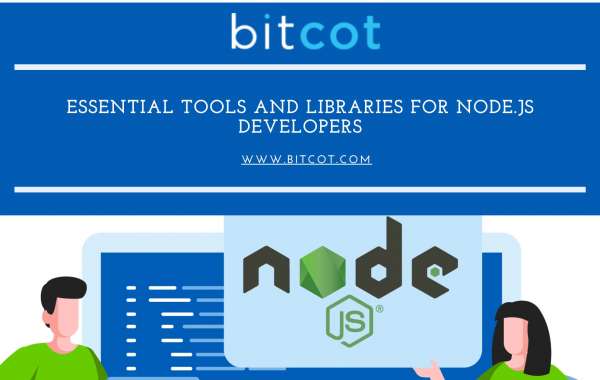Node.js has revolutionized server-side development by enabling developers to use JavaScript to build scalable and efficient applications. The Node.js ecosystem is rich with tools and libraries that can enhance productivity, streamline development, and improve application performance. In this blog, we will explore some of the essential tools and libraries every Node.js developer should consider using.
- Express.js
Overview:
Express.js is a minimal and flexible Node.js web application framework that provides a robust set of features to build web and mobile applications.
Key Features:
- Simplifies routing and middleware management.
- Supports various template engines.
- Integrates seamlessly with other libraries and databases.
Usage: Install Express.js via npm and create a basic server:
```bash
npm install express
```
```javascript
const express = require('express');
const app = express();
app.get('/', (req, res) => {
res.send('Hello World!');
});
app.listen(3000, () => {
console.log('Server is running on port 3000');
});
```
- Nodemon
Overview:
Nodemon is a utility that automatically restarts your Node.js application when file changes in the directory are detected.
Key Features:
- Saves time during development by eliminating manual restarts.
- Easy to integrate with existing projects.
- Configurable to watch specific files and directories.
Usage: Install Nodemon globally or locally:
```bash
npm install -g nodemon
```
Start your application with Nodemon:
```bash
nodemon app.js
```
- Mocha and Chai
Overview:
Mocha is a feature-rich JavaScript test framework running on Node.js, while Chai is an assertion library that pairs well with Mocha for writing test cases.
Key Features:
- Supports asynchronous testing.
- Provides various interfaces for writing tests.
- Works with any assertion library (Chai is commonly used).
Usage: Install Mocha and Chai:
```bash
npm install mocha chai --save-dev
```
Create a test file `test.js`:
```javascript
const { expect } = require('chai');
describe('Array', () => {
it('should return -1 when the value is not present', () => {
expect([1, 2, 3].indexOf(4)).to.equal(-1);
});
});
```
Run the tests:
```bash
mocha test.js
```
- Mongoose
Overview:
Mongoose is an elegant MongoDB object modeling tool designed to work in an asynchronous environment.
Key Features:
- Simplifies data modeling and schema validation.
- Supports middleware and hooks.
- Provides a rich query API.
Usage: Install Mongoose:
```bash
npm install mongoose
```
Connect to MongoDB and define a schema:
```javascript
const mongoose = require('mongoose');
mongoose.connect('mongodb://localhost/mydatabase', { useNewUrlParser: true, useUnifiedTopology: true });
const userSchema = new mongoose.Schema({
name: String,
email: String,
});
const User = mongoose.model('User', userSchema);
const newUser = new User({ name: 'John Doe', email: 'john.doe@example.com' });
newUser.save().then(() => console.log('User saved'));
```
- Jest
Overview:
Jest is a delightful JavaScript testing framework with a focus on simplicity. It works out of the box for most Node.js projects.
Key Features:
- Provides a great developer experience with fast feedback.
- Built-in support for mocks, spies, and coverage.
- Snapshot testing for easier UI testing.
Usage: Install Jest:
```bash
npm install jest --save-dev
```
Create a test script in your `package.json`:
```json
"scripts": {
"test": "jest"
}
```
Write a test file `sum.test.js`:
```javascript
const sum = require('./sum');
test('adds 1 + 2 to equal 3', () => {
expect(sum(1, 2)).toBe(3);
});
```
Run the tests:
```bash
npm test
```
- ESLint
Overview:
ESLint is a tool for identifying and fixing problems in your JavaScript code, making it easier to maintain code quality and consistency.
Key Features:
- Highly configurable with various presets.
- Supports custom rules and plugins.
- Integrates with most code editors.
Usage: Install ESLint:
```bash
npm install eslint --save-dev
```
Initialize ESLint:
```bash
npx eslint --init
```
Create a configuration file `.eslintrc.js` and run ESLint on your files:
```bash
npx eslint yourfile.js
```
- Socket.io
Overview:
Socket.io enables real-time, bidirectional, and event-based communication between the browser and the server, ideal for building chat applications, live feeds, and notifications.
Key Features:
- Real-time analytics.
- Binary streaming.
- Presence detection.
Usage: Install Socket.io:
```bash
npm install socket.io
```
Set up a basic Socket.io server:
```javascript
const app = require('http').createServer();
const io = require('socket.io')(app);
io.on('connection', socket => {
console.log('a user connected');
socket.on('disconnect', () => {
console.log('user disconnected');
});
});
app.listen(3000, () => {
console.log('Server is running on port 3000');
});
```
- Passport.js
Overview:
Passport.js is a simple and flexible authentication middleware for Node.js, supporting various strategies including local, OAuth, and OpenID.
Key Features:
- Extensive collection of authentication strategies.
- Easy integration with Express.js.
- Customizable and modular.
Usage: Install Passport.js and a strategy:
```bash
npm install passport passport-local
```
Set up Passport.js:
```javascript
const passport = require('passport');
const LocalStrategy = require('passport-local').Strategy;
passport.use(new LocalStrategy(
(username, password, done) => {
// User authentication logic
}
));
app.use(passport.initialize());
app.use(passport.session());
```
Conclusion
Utilizing the right tools and libraries can significantly enhance the efficiency, maintainability, and scalability of Node.js applications. From Express.js for web frameworks to Mongoose for database management, and from Jest for testing to Passport.js for authentication, each tool and library serves a unique purpose in the development process. By incorporating these essential tools into your workflow, you can streamline your development process and build robust, high-performance applications with ease.
Also Read: 7 Reasons Why Node.js is Best Suited for Enterprise Applications




